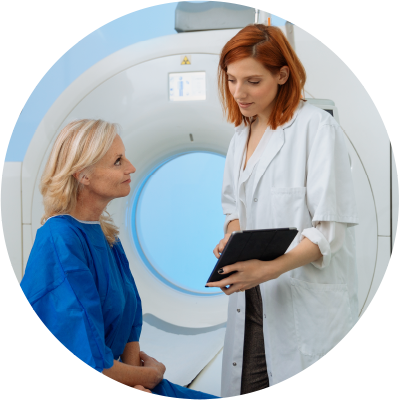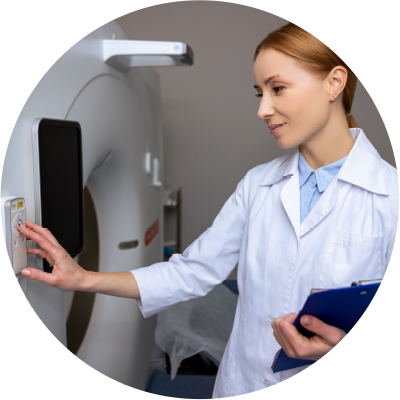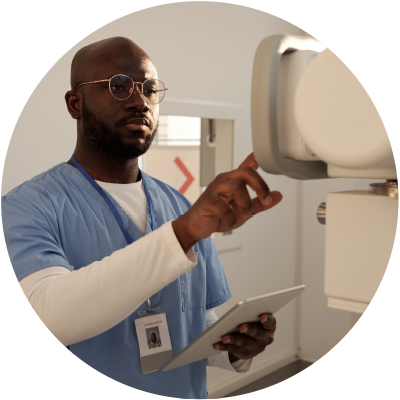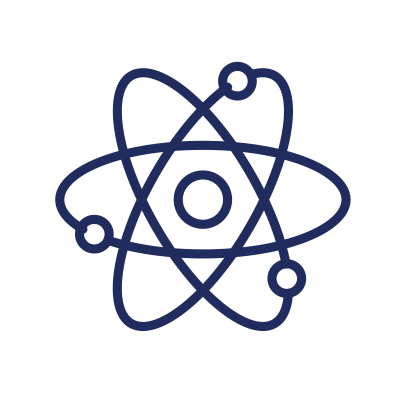Become a “Nuc Med Tech”
Nuclear Medicine
The Nuclear Medicine Technologist program meets the American Registry of Radiologic Technologist (“ARRT”) requirements for graduates pursuing an ARRT certification. The entire program is designed to prepare students to gain the knowledge and skills necessary to operate diagnostic imaging equipment and produce high-quality medical images that can help healthcare providers diagnose and treat a wide range of medical conditions.
Nuclear medicine is a medical specialty that uses small amounts of radioactive materials, called radiotracers, to diagnose and treat a variety of diseases and conditions. These radiotracers are injected, inhaled, or ingested by the patient, and are detected by a special camera or scanner that produces images of the body’s internal organs and tissues.
This method of medical imaging is used to diagnose and treat a range of conditions, including cancer, heart disease, neurological disorders, and bone and joint disorders. In addition to diagnostic imaging, nuclear medicine can also be used for targeted radiation therapy to treat certain cancers and other conditions.
Though not commonly known to the general public compared to other medical imaging modalities, Nuclear Medicine has been around since the 1940’s and gradually has been adopted by many medical professionals to diagnose several medial conditions. Since then, there have been many technological advances to improve the precision and acurracy of these procedures.
Studying to become a Nuclear Medicine Technologist involves learning about human anatomy, physiology, medical terminology, and diagnostic imaging procedures, as well as developing the technical skills necessary to operate imaging equipment and maintain patient safety. Our program further provides students this essential knowledge and skill to ensure the graduate’s future patients receive high-quality imaging services and that healthcare providers have the information they need to provide the best possible care to their patients.
Class Structure and Delivery
Your Responsibilities
As a Nuclear Medicine Technologist, your responsibilities include:

Prepare and administer radiopharmaceuticals
Nuclear Medicine Technologists prepare their patients to administer radioactive material to patients via injection, inhalation or ingestion following safety protocols.

Operating imaging equipment
Nuclear Medicine Technologists are responsible for operating imaging equipment, such as gamma cameras, PET scanners, and SPECT scanners to capture images of organs and tissue within the body.

Maintaining safety protocols
Nuclear Medicine Technologists must ensure that safety protocols are followed to protect themselves and their patients from overexposure to radiation.

Ensuring patient safety
Radiologic technologists must take precautions to ensure the safety of patients and themselves during imaging exams. This may involve using radiation shielding, minimizing radiation exposure, and following strict safety protocols.

Communicating with healthcare providers
Nuclear Medicine Technologists may need to communicate with healthcare providers, such as radiologists and physicians, about the results of imaging exams and any concerns related to the patient's health.
Why a Career in Nuclear Medicine Technology?
According to the Bureau of Labor Statistics, there are approximately 1,000 job openings every year over the next decade. This is mainly due in part to the growth of the field as more well-experienced Nuclear Medicine Technologists are moving on to management positions, move on to other modalities or exiting the workforce as they retire.
Nuclear Medicine Technology can
be right for you if

You Enjoy Career Stability
It is no secret that careers in healthcare are one of the most stable fields to be in at any given time, but forming a part of a highly skilled medical imaging group of professionals will almost certainly offer a high level of employmet security.

You are Attracted to Competitive Salaries
Nuc Med Techs are typically well-compensated for the essential work they perform. Salaries have been on the rise in this area of imaging. According to the Bureau of Labor Statistics, the average income for a Nuc Med Tech in the major metropolitan area of Los Angeles in 2023, is well over $130,000/year. This means that if you remain in the field long enough to earn a reputation as a well-qualified and knowledgable technologist, your potential earnings can be in that range.

You are Fascinated by Medical Technology
Even if you do not have any background in medical imaging, you will be amazed at how using radiation technology can produce medical imaging essential to diagnose medical conditions

You Like Advancement
Overtime Nuc Med Techs also pursue additional certifications to further their careers in CT, Radiologic Technology or MRI.

You Want a Rewarding Profession
There is nothing more rewarding in healthcare than being one of many professionals who contribute to a better way of life of a patient. Helping patients and contributing to their overall health and well-being by producing images, is a very specialized skill that physicians and surgeon highly rely on to make critical medical decisions
Q&A of Becoming a Nuclear Medicine Technologist ("Nuc Med")
Do I need at least High School Diploma or GED to register in the Nuc Med program?
Yes. Having obtained basic General Education from an accredited and verifiable institution, shows you have a basic level of comprehension to absorb the information given in lectures and during lab practice. If you have not completed your basic level of education, there are a couple of ways you can get started.
- Contact your local high school for information on taking the remainder of the credits needed to complete your high school education.
- Visit the GED.com site to learn more about obtaining your high school equivalency examination.
Do I need a minimum of an Associate Degree to become a Nuc Med Tech?
Yes. An associate’s degree is required if you want to achieve the coveted ARRT certification in nuclear medicine. Our program is designed for applicants who have not achieved this level of education, and who will ultimately be awarded a degree upon completion of the program. If you have college level classes, or if you have already satisfied this requirement, NPCollege will need to evaluate your college transcripts to determine transferrability of eligible credits.
Is a license required to work as Nuc Med Tech?
This is a big yes. Unlike many other professions in the medical field, the California Department of Public Health, Radiologic Health Branch (CDPH-RHB) does issue licenses for professions dealing with any type of radioactive imaging. In addition, Nuc Med Techs are required to pass an approved certification exam such as one offered by ARRT. Remember that in order to qualify for the ARRT examination, the program you attend, must be at a college approved by ARRT.
Is NPCollege accredited or approved by ARRT?
Yes. Though we hold many accreditations and approvals from many registries for different fields, ARRT is one of two registries approved by (CDPH-RHB) for the Nuc Med Tech program. This is one of the most important questions you should ask any college.
How long is the program at NPCollege?
The length of this program is approximately 20-24 months, depending on the number of credits needed to complete the program, and fully prepare you for externship, registry testing, and future employment challenges.
Can I transfer credits from another college to take the Nuc Med Tech program at NPCollege?
If you are in pursuit of an associate’s degree, you can transfer General Education (GE) units if those units meet GE requirements. There is also the option of challenging some of the introductory core classes. To be eligible for class challenge, you need to show evidence of field-related experience, or have taken similar classes at another institution.
Can NPCollege credits transfer to another institution?
The transferability of credits you earn at NPCollege is at the complete discretion of the institution to which you seek to transfer to. Acceptance of the degree, diploma, or certificate you earn in your educational program at NPCollege is also at the complete discretion of the accepting Institution. For this reason, you should make certain that your attendance at NPCollege will meet your educational goals.
How can I submit an application for NPCollege's Nuc Med program?
Before we look into any application, NPCollege does require you to schedule a meeting with the admissions office for further review of your academic background, and your goals. This is important because it allows us to make recommendations for your career path with only the credits you need to achieve the coveted certification from ARRT and registrations with (CDPH-RHB) to obtain a license.
Program Completion Time
Associate Degree — 24 months / 104 weeks / 2585 hours
Get Started Today!
By clicking Submit, I expressly authorize National Polytechnic College to contact me regarding educational services via email, telephone or text at the email address and phone numbers provided. I understand this is not required to attend National Polytechnic College. MSG & Data rates may apply. Message frequency may vary. To unsubscribe reply STOP and to get assistance reply HELP. Find our Privacy Policy at https://npcollege.edu/privacy-policy